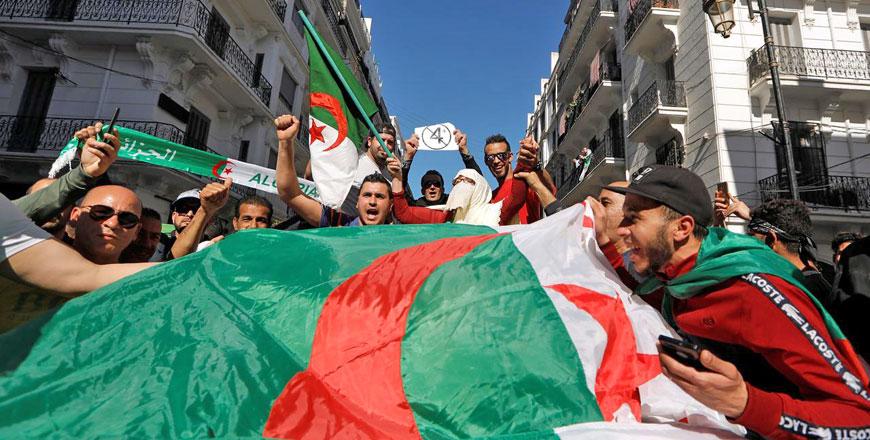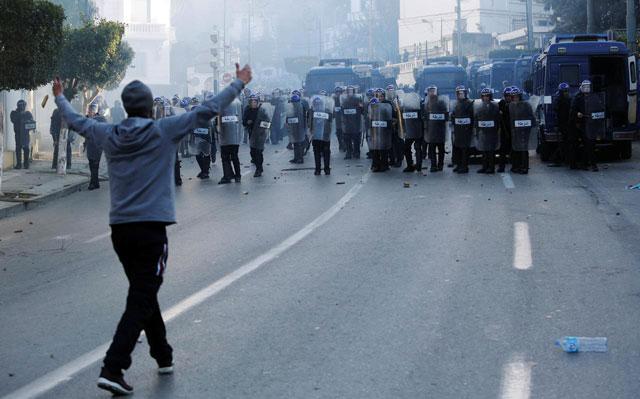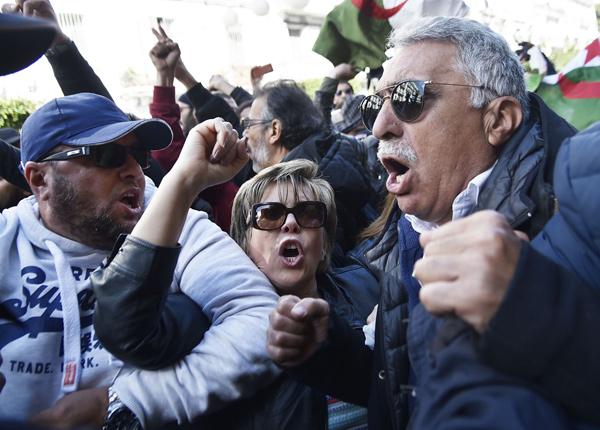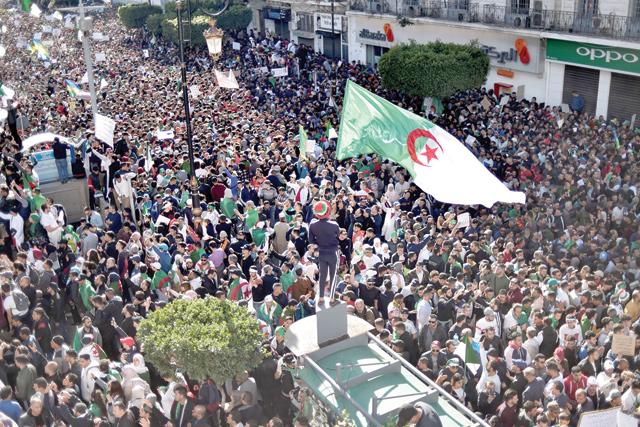You are here
Algerians demand Bouteflika quits in biggest protest yet
By Reuters - Mar 16,2019 - Last updated at Mar 16,2019

People carry their national flags as they protest over President Abdelaziz Bouteflika's decision to postpone elections and extend his fourth term in office in Algiers, Algeria, on Friday (Reuters photo)
ALGIERS — Hundreds of thousands of people protested in central Algiers on Friday in the biggest demonstration against President Abdelaziz Bouteflika’s 20-year rule since unrest began last month.
Protesters crammed streets and squares in the capital after Friday prayers, many draped in Algeria’s green, white and red flag. Demonstrations also took place in Bejaia, Oran, Batna, Tizi Ouzou and other cities.
“Bouteflika and his men must go as soon as possible,” said Yazid Ammari, 23, a student.
Reuters journalists estimated the crowd at hundreds of thousands of people, though there was no police estimate. The number fell to thousands by late afternoon.
A statement from the Algerian national police said it arrested people involved in vandalism, theft and destruction of public and private property.
No heavy clashes were reported but the authorities said some 75 protesters were arrested and 11 policemen were slightly injured during the demonstrations.
Bouteflika on Monday reversed a decision to stand for another term after weeks of demonstrations against him, but he stopped short of relinquishing office and said he would stay on until a new constitution is adopted.
Algerians quickly rejected his offer and demanded that the 82-year-old president hand over power to a young generation of leaders who can create jobs and stamp out corruption.
“Those who think we are tired are wrong. Our protests will not stop,” said doctor Madjid Benzida, 37, as police blocked streets leading to government offices and parliament.
Bouteflika has rarely been seen in public since suffering a stroke in 2013. Protesters say he is no longer fit for office.
The president has been losing allies in recent days since returning from medical treatment in Switzerland.
Hocine Kheldoun, a senior figure from the ruling National Liberation Front Party, known by its French acronym FLN, said in an interview on Thursday night the long-ruling president was “history now”.
The remarks by Kheldoun to Ennahar television were another setback for Bouteflika, who hoped to pacify Algerians by promising to take steps to change a political landscape that has been dominated for decades by a ruling elite.
Kheldoun, a former ruling party spokesman, became one of the most senior FLN officials to break with Bouteflika publicly, saying the party had to look forward and support the aims of demonstrators.
Some parents brought their children to Friday’s demonstration.
“I want a better future,” said Mohamed Kemime, 10, draped in a national flag.
One of Algeria’s most influential clerics appealed for patience.
“Let’s be optimistic, Algeria needs to overcome its crisis,” said Mohamed Abdelkader Haider from an Algiers mosque.
The new prime minister, Noureddine Bedoui, said on Thursday he would form a temporary government of technocrats and others to work towards political change, and he urged the opposition to join in a dialogue.
‘Game over’
A former minister who is familiar with Bouteflika’s inner circle told Reuters that the president could not survive given the pressure building against him.
“Game over. Bouteflika has no choice but to quit now,” the former minister said on condition of anonymity.
Algeria is a major oil and gas producer, but so far exports have not been affected by the unrest. Its biggest oil field Hassi Messaoud and its Hassi Rmel gas field have been operating normally, a source from state oil giant Sonatrach told Reuters.
Many Algerians say that the president and other veterans of the 1954-62 war of independence against France have neglected them for decades.
The military, which has traditionally played a behind-the-scenes power broker role, has distanced itself from Bouteflika and stayed in its barracks throughout the crisis. It is expected to retain influence under all scenarios.
Algeria was relatively untouched when the 2011 “Arab Spring” uprisings swept away veteran autocrats in the Arab world. Bouteflika and his allies, effective manipulators of the opposition, managed to avoid major unrest by spending oil revenue on popular programmes, such as handing out low interest loans and housing.
Bouteflika helped to defeat a civil war against Islamist insurgents in which tens of thousands of people were killed in the 1990s, and many Algerians long accepted heavy-handed rule as the price of stability.
But the public has lost patience with deteriorating economic conditions and the FLN’s failure to make the transition to a new generation despite the president’s failing health.
Related Articles
ALGIERS — Thousands of people in cities across Algeria marched on Friday to protest against President Abdelaziz Bouteflika’s plan to seek a
ALGIERS — Algerian police fired tear gas to disperse hundreds of demonstrators on a third straight day of rare political protests again
ALGIERS — Algeria's newly-appointed prime minister has started talks to form a new government, state media reported on Sunday, in a move des



















